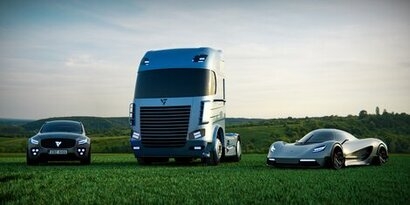
Key points raised by the white paper include the following:
Fossil fuels in transport will not be replaced with a single, one-size-fits-all alternative.
It’s not a simple case of lithium-ion batteries versus hydrogen fuel cells, the two technologies are complementary.
The useful rule of thumb is that where weight and range are critical, a fuel cell electric vehicle (FCEV) generally works better, and where it is not critical, a battery electric vehicle (BEV) is generally a simpler solution.
To solve the challenge of zero emission vehicles, the key target is for both battery electric vehicle and fuel cell electric vehicle powertrain technologies to improve as quickly as possible.
As societies race to decarbonise the global economy, Cleantech engineering has never been more important says Viritech. The company develops advanced technologies including integrated hydrogen powertrains, vehicle control systems, structural graphene pressure vessels and high-performance energy storage to enable hydrogen application in automotive, aerospace, marine and distributed power generation.
In its new whitepaper, Viritech looks at vehicle electrification to understand the underlying issues facing engineers as they develop solutions for zero emissions vehicles. The company says solving the challenges of zero emissions vehicles will be hard work.
According to Viritech, the two current contenders as onboard energy sources for road transport are lithium-ion batteries (Battery Electric Vehicles or BEVs) and hydrogen fuel-cells (Fuel Cell Electric Vehicles or FCEVs). Both are Electric Vehicles (EVs) and over the last about 10 years there has been great debate as to which is better. Viritech points out that the important thing to remember is both require electricity to be generated from scratch (either on or off vehicle), and this provides new, and in some cases greater, challenges than the established method of drilling a hole in the ground and refining ready-made energy in the form of oil into hydrocarbon fuels.
“As CTO of Viritech I spend my days focused on what we can do in sensible timescales to bring about the hydrogen revolution” said Matt Faulks. “With climate change accelerating, at Viritech we feel an urgency to put our technology expertise to use for applications that will have a near term/immediate impact. There is no single solution that will replace fossil fuels. The thing about zero emissions vehicles is there is no low-hanging fruit. Our future lies in an ecosystem of solutions relying on a variety of technologies that are best suited for particular jobs – lithium batteries are a fantastic solution where mass compounding does not form part of the critical path, whilst hydrogen power provides mass and range parity with existing ICE vehicles, which is critical for large vehicles such as HGVs.”
Viritech contends that to solve the challenge of zero emission vehicles, the key target is for both battery electric vehicle and fuel cell electric vehicle powertrain technologies to improve as quickly as possible. We have consumed the “low hanging fruit” of hydrocarbon fuels refined from oil for over a century and it is absolutely clear that this is the last decade where we will continue to do so. The development of zero emissions vehicles (ZEVs) is vital to maintaining the global economy and is a challenge that requires a complex series of solutions to meet growing global demand.
“Climate change is the critical issue of our times” added Timothy Lyons, Viritech’s CEO and Co-Founder. “We’ve got to find the solutions now to some of the most difficult challenges we face in our transition away from fossil fuels.”
For additional information:
How To Solve The Challenge of Zero Emission Vehicles (whitepaper)

